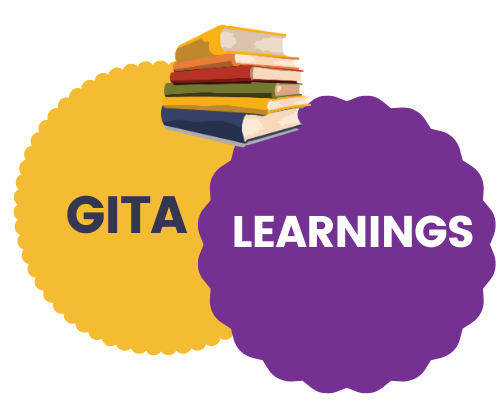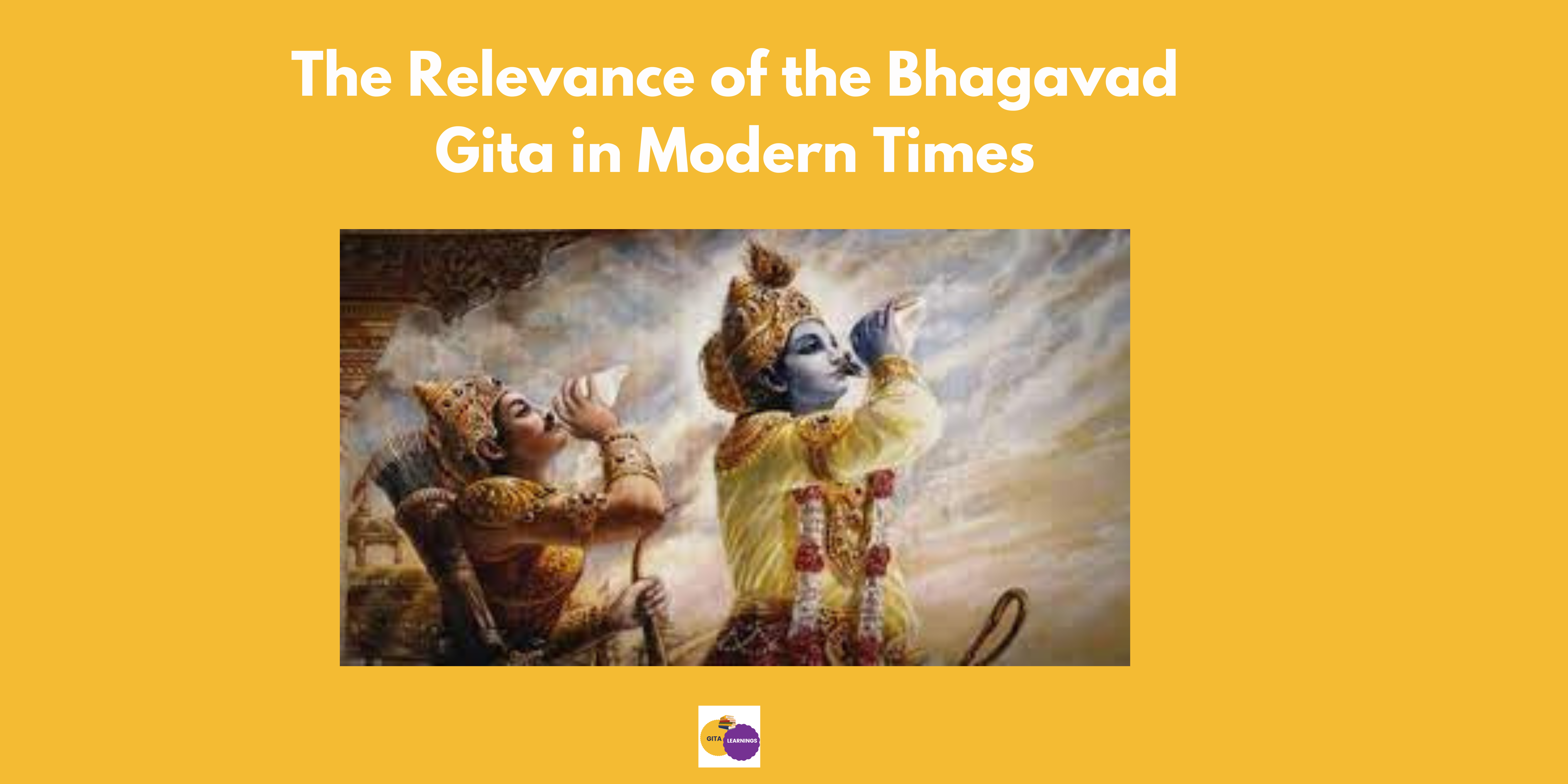The Bhagavad Gita is a sacred text of Hinduism that is over 2,000 years old. It is a dialogue between the warrior Arjuna and his charioteer Krishna, an incarnation of Vishnu. The Gita is set on the eve of a great battle, and Arjuna struggles with the moral dilemma of whether or not to fight. Krishna counsels Arjuna on the nature of duty, action, and spirituality, and the Gita offers a comprehensive guide to living a good and meaningful life. But, still, Bhagavad Gita is relevant in Modern times. That’s what made us write this detailed article.
As we delve into the timeless teachings of the Bhagavad Gita, we discover a treasure trove of wisdom that remains profoundly relevant today. This article explores the enduring lessons that this sacred scripture imparts, emphasizing the importance of duty, action, detachment, and spirituality in our lives.
Duty: Do your duty without worrying about the outcome.
We all have different roles and responsibilities in life. The Bhagavad Gita teaches us to fulfill our duties without getting attached to the results. This means doing our best but not letting our happiness or sadness depend on whether we succeed or fail.
Action: Take action, even if you’re afraid.
The Bhagavad Gita says that action is better than inaction. This doesn’t mean we should act without thinking, but we should not let fear or doubt stop us from doing what we know is right.
Detachment: Let go of material possessions and desires.
The Bhagavad Gita teaches us to detach ourselves from the material world and the fruits of our actions. This means not getting attached to our possessions, successes, or failures. When we are detached, we can find true happiness and contentment.
Spirituality: Find inner peace and connect with your higher self.
The Bhagavad Gita says that the ultimate goal of life is moksha or liberation from the cycle of birth and death. This can be achieved through spiritual practice, such as meditation and yoga. When we connect with our higher selves, we find inner peace and a sense of purpose in life.
Relevance in Modern Times
The Bhagavad Gita’s enduring relevance becomes even more apparent when we consider the challenges and uncertainties of contemporary life.
1. Confronting Uncertainty
In an age marked by rapid change and uncertainty, Gita’s message to act with courage and conviction is a beacon of hope, even in the face of ambiguity. It reminds us that taking action, guided by our inner moral compass, is a path to personal growth and progress.
2. Making Difficult Choices
The Bhagavad Gita equips us with the wisdom needed to make challenging decisions. It emphasizes the importance of duty and encourages us to detach from the outcomes of our actions. This guidance empowers us to choose based on ethical principles rather than convenience.
3. Battling Stress and Anxiety
The Gita’s teachings on living in the present moment and finding contentment with what we have offer valuable tools for combatting stress and anxiety. Amidst the pressures of modern life, these lessons remind us to prioritize inner peace and well-being.
4. Seeking Meaning in Life
For those on a quest for meaning and purpose, the Bhagavad Gita provides profound insights into the realm of spirituality and self-realization. It offers a path to connect with our higher selves, discover inner harmony, and find deeper significance in our existence.
The Bhagavad Gita is still relevant because it addresses many of our challenges today. It teaches us about the importance of:
- Duty: We all have certain duties to perform in life, whether to our families, communities, or professions. The Gita teaches us that we should fulfill our duties without attachment to the fruits of our actions.
- Action: We should not be afraid to act, even if we are uncertain of the outcome. The Gita teaches us that action is better than inaction and that we should always strive to do our best.
- Detachment: We should not be attached to the material world or to the fruits of our actions. The Gita teaches us that we should be content with what we have and that we should not let our desires control us.
- Spirituality: We should strive to connect with our higher selves and live a peaceful and harmonious life. The Gita teaches us that the ultimate goal of life is to achieve moksha, or liberation from the cycle of birth and death.
The Bhagavad Gita is a timeless classic that has something to offer everyone. It is a profound and inspiring text that can help us to live better lives. Here are some specific ways in which the Bhagavad Gita can be relevant to us in modern times:
- In the face of uncertainty: The Gita teaches us that we should not be afraid to act, even if we are uncertain of the outcome. This is a valuable lesson in a constantly changing and uncertain world.
- When faced with difficult choices: The Gita can help us to make difficult choices by teaching us about the importance of duty and action. It can also help us detach from the fruits of our actions to decide what is right rather than easy.
- When we are struggling with stress or anxiety: The Gita teaches us about the importance of living in the present moment and being content with what we have. This can be a helpful reminder when we feel stressed or anxious about the future.
- When looking for meaning in life: The Gita can help us find meaning in life by teaching us about the importance of spirituality and self-realization. It can also help us connect with our higher selves and live a peaceful and harmonious life.
The Bhagavad Gita is a rich and complex text that can be interpreted differently. However, its core message is one of love, compassion, and wisdom. It is a timeless classic that can help us to live better lives, regardless of our religious beliefs or cultural background.
Conclusion
Though ancient in origin, the Bhagavad Gita continues to shine as a timeless classic. Its love, compassion, and wisdom teachings transcend religious and cultural boundaries, offering guidance to anyone seeking a more meaningful and purposeful life. In an ever-changing world, the Gita is a steadfast companion, reminding us of the enduring importance of duty, action, detachment, and spirituality. As we navigate the complexities of modern life, let the wisdom of the Bhagavad Gita illuminate our path toward a more fulfilling existence.
Frequently Asked Questions
1. Is the Bhagavad Gita only relevant to Hindus?
- No, the Bhagavad Gita’s teachings are universal and can be appreciated and applied by people of all backgrounds and beliefs.
2. How can I incorporate the Gita’s teachings into my daily life?
- Start by reading and reflecting on its verses regularly. Try to apply its lessons of duty, action, detachment, and spirituality in your daily activities.
3. Can the Bhagavad Gita help with personal growth and self-improvement?
- Absolutely. The Gita provides valuable insights and practical wisdom that can guide personal growth and self-improvement journeys.
4. What is the significance of Arjuna’s moral dilemma in the Gita?
- Arjuna’s dilemma represents the universal struggle between duty and personal desires. It serves as a symbol of the inner conflicts we all face at times.
5. Where can I find a copy of the Bhagavad Gita to read for myself?
- You can find translations and interpretations of the Bhagavad Gita in most bookstores and online retailers. It’s widely available in various languages for readers worldwide.

